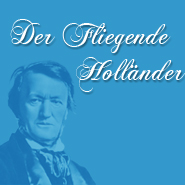| Title: | Flying Dutchman Screening |
|---|---|
| Date: | Tuesday 26 February 2008 |
| Venue: | Lecture Theatre Q, Newman Building, Belfield |
| Organiser: | UCD School of Music |
| Time: | 18:30 |
| Contact: | Wolfgang Marx |
| Audience: | All Welcome |
Flying Dutchman Screening
Harry Kupfer's famous Bayreuth version of "Der fliegende Holländer" (The Flying Dutchman) from 1986, with Simon Estes as the Dutchman, Lisbeth Balslev as Senta and Matti Salminen as her father Daland, will be screened on Tuesday 26 February 2008 in Lecture Theatre Q, Newman Building, Belfield. The screening is part of the UCD School of Music’s module on "Aspects of German Opera". The event is open to all students and staff.
The Flying Dutchman ("Der fliegende Holländer") was Richard Wagner’s first success as an opera composer. The opera premiered in Dresden in 1843. It is based on the legend of the Dutch captain who is cursed to sail the seven seas until being redeemed by the love of a woman (most recently, this story played a part in the "Pirates of the Caribbean" movie series, with a ship rather than its captain featuring as "The Flying Dutchman").
Every seven years the Dutchman is allowed to go ashore for one day; only if he finds a woman faithful to him until she dies will the curse be lifted and he and his crew will be allowed to rest. However, if her love wavers, it is her who is condemned to death.
After countless failed attempts, the opera sees him approaching a Norwegian village where he meets Senta, a woman convinced she is destined to become his saviour. Eventually the Dutchman sails away again, wrongly believing that she has betrayed him, yet Senta throws herself down from a cliff in order to prove her love and dedication. Her death leads to his redemption.
The opera is the earliest example of Wagner’s concept of "Liebestod" (the ultimate fulfillment of love in death) – in most of his later operas, lovers can ultimately only come together in death, and it is usually a woman who sacrifices her life in the pursuit of this goal (Elsa, Isolde, Brünnhilde).
The opera features some of Wagner’s best-known music, including Senta’s ballad, the sailors’ chorus and the storm music dominating the overture (which, according to Wagner, was inspired by a severe storm he witnessed aboard a vessel in the Baltic Sea).

